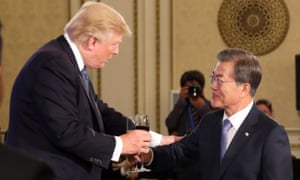
The menu at South Korea’s state banquet for Donald Trump has left a nasty taste in Japan, after the president was served seafood caught off islands at the centre of a long-running territorial dispute between Seoul and Tokyo.
Japanese officials have also complained about the decision to invite a former wartime sex slave to the event, held earlier this week during the second leg of Trump’s five-nation tour of Asia.
Conservative media in Japan labeled the banquet “anti-Japanese” for featuring shrimp from near Dokdo – a rocky outcrop known in Japan as Takeshima. Both countries claim sovereignty over the islands, which are administered by Seoul.
The menu also included grilled sole and beef ribs accompanied by a gravy made with 360-year-old soy sauce.
In another apparent jab at Japan, the guest list included Lee Yong-soo, who was forced to work in Japanese military brothels before and during the second world war.
Photographs from the dinner, held at the presidential Blue House, show Trump embracing the 88-year-old Lee after her name was announced at the banquet, according to South Korean media.
Japan’s top government spokesman, Yoshihide Suga, wondered if it had been wise to make such diplomatically sensitive gestures at a time when Japan, the US and South Korea were attempting to pressure North Korea into giving up its ballistic missile and nuclear weapons programmes.
“At a time when stronger coordination … is required to deal with the North Korea issue, and when President Trump has chosen Japan and South Korea as the first stops on his trip, there is a need to avoid making moves that could negatively affect that close coordination,” Suga said.
The Korea Herald quoted a South Korean presidential spokesman as saying: “Lee’s invitation was designed to deliver a message to Trump and ask him to have a balanced view of the comfort woman issue and historical dispute between South Korea and Japan.”
Japan has lodged a protest through diplomatic channels, according to Kyodo news, describing Lee’s presence as going against the spirit of a 2015 agreement on the comfort women – a euphemism for as many as 200,000 women, mostly from the Korean peninsula, who were coerced into working in Japanese frontline brothels before and during the second world war.
Japan agreed to contribute 1 billion yen (£6.7m) to a fund for the fewer than 40 surviving victims, most of whom are in their 80s and 90s, while both sides agreed that the controversy had been “finally and irreversibly” settled.
The 2015 deal has come under strain in recent months, however, over the installation of statues symbolising former sex slaves in South Korea and overseas. South Korea’s liberal president, Moon Jae-in, has ordered a review of the agreement, saying it does not reflect the wishes of the majority of the South Korean people.
Japan Forward, an English-language site that carried articles from the conservative Sankei newspaper, said: “It is undeniable that Pyongyang’s brazen efforts to use Trump’s visit to promote its version of the comfort women issue and the ownership of Takeshima could have ramifications for the future of Japan-Korea relations.”
Both countries, though, at least agreed on the need to indulge Trump’s love of beef.
He and Japan’s prime minister, Shinzo Abe, ate hamburgers, made with American beef, before playing golf last weekend. More meat – this time from Japan – was on the menu when the leaders and their wives dined at a teppanyaki restaurant in Tokyo.
Source:-.theguardian


